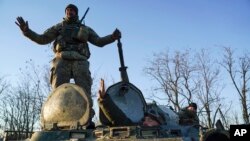Ukrainian officials on Friday upped the ante in the growing confrontation with Russia, announcing a travel ban for most Russian males and searching the home of an influential cleric of the Russian Orthodox Church.
The long-simmering conflict bubbled over Sunday when Russian border guards rammed into and opened fired on three Ukrainian vessels near the Crimean Peninsula, which Moscow annexed in 2014. The vessels were trying to pass through the Kerch Strait on their way to the Sea of Azov. The Russians then captured the ships and 24 crew members.
The Ukrainian parliament on Monday adopted the president's motion to impose martial law in the country for 30 days in the wake of the standoff.
There has been growing hostility between Ukraine and Russia since Moscow's annexation of the Crimean Peninsula from Ukraine in 2014. Russia has also supported separatists in Ukraine's east with clandestine dispatches of troops and weapons. Fighting there has killed at least 10,000 people since 2014 but eased somewhat after a 2015 truce.
Petro Tsygykal, chief of the Ukrainian Border Guard Service, announced at a security meeting on Friday that all Russian males between 16 and 60 will be barred from traveling to the country while martial law is in place.
President Petro Poroshenko told the meeting that the measures are taken "in order to prevent the Russian Federation from forming private armies" on Ukrainian soil.
The announcement follows Thursday's decision by U.S. President Donald Trump to scrap the much-anticipated meeting with Russian leader Vladimir Putin. Trump said it isn't appropriate for him to meet with Putin since Russia hasn't released the Ukrainian seamen.
Meanwhile, the Ukrainian intelligence agency announced on Friday that they are investigating a senior cleric of the Russian Orthodox Church.
Ihor Guskov, chief of staff of the SBU intelligence agency, told reporters that its officers are searching the home of Father Pavlo, who leads the Pechersk Monastery in Kiev. He said the cleric is suspected of "inciting hatred."
The Pechersk Monastery, the spiritual center of Ukraine, is under the jurisdiction of the Russian Orthodox Church.
The Ukrainian church, which has been part of the Russian Orthodox Church for centuries, moved close to forming an independent church — fueled by the conflict with Russia Ukraine's Orthodox communities earlier this year.
There are currently three Orthodox communities in Ukraine, including two breakaway churches. Ukrainian authorities sought to portray the Russian Orthodox clerics in Ukraine as supporting separatists.
Ukraine's president announced on Thursday that the Constantinople patriarchy has approved a decree granting the Ukrainian Orthodox Church independence from the Russian Orthodox Church, a major boost to the president's approval ratings.
Both the Russian Orthodox Church and Russian authorities are strongly against the move and have warned Ukraine not to do it, fearing sectarian violence.
Russian government-appointed ombudswoman for Crimea told Russian news agencies that all the seamen have been transported from a detention center in Crimea. The three commanders have been taken to Moscow, she said. It wasn't immediately clear where the other 21 have been taken.
A Crimea court earlier this week ruled to keep the Ukrainian seamen behind bars for two months pending the investigation.




